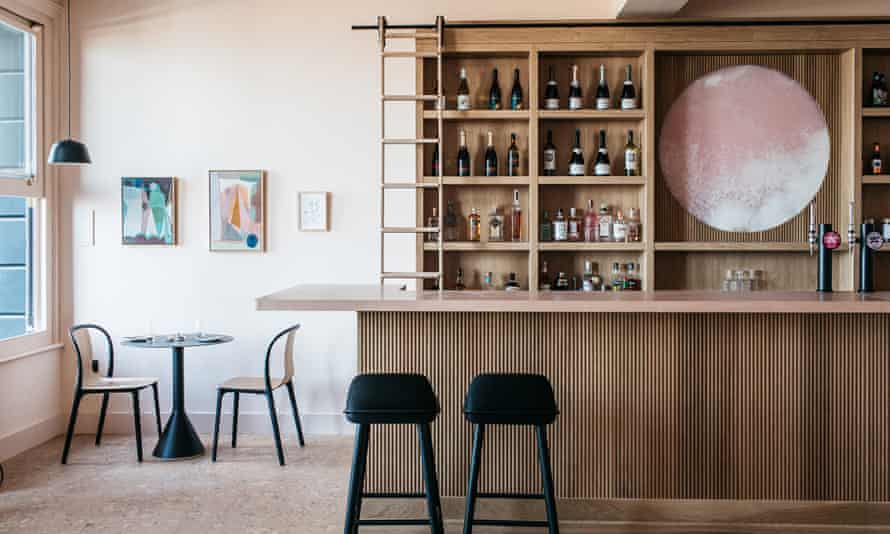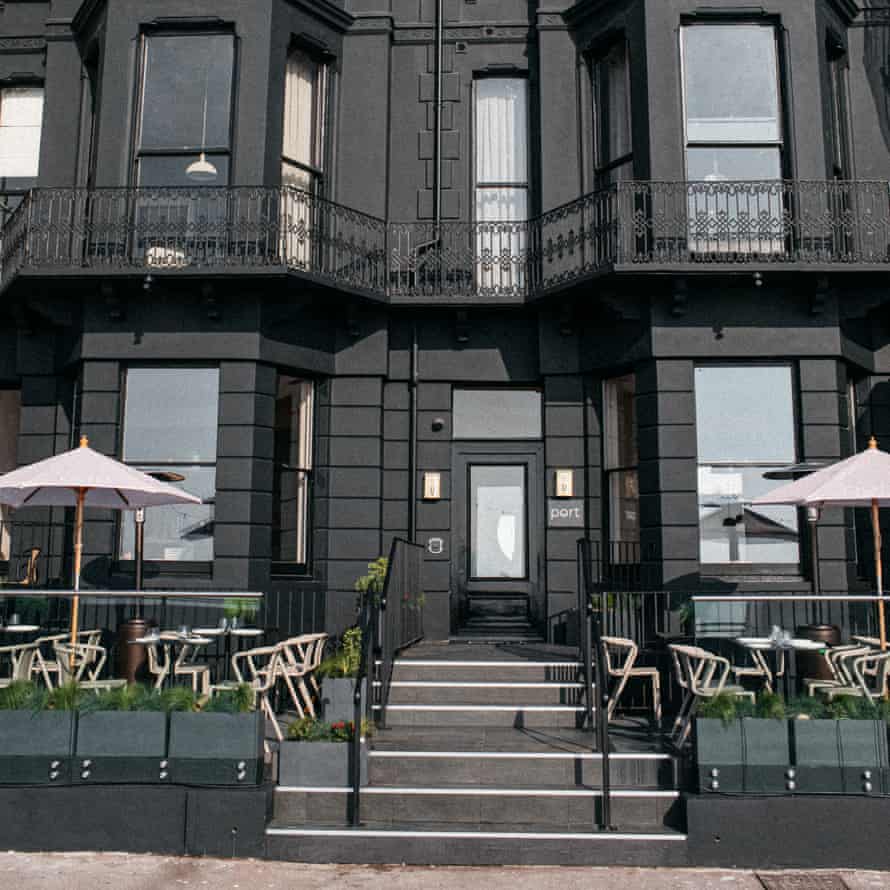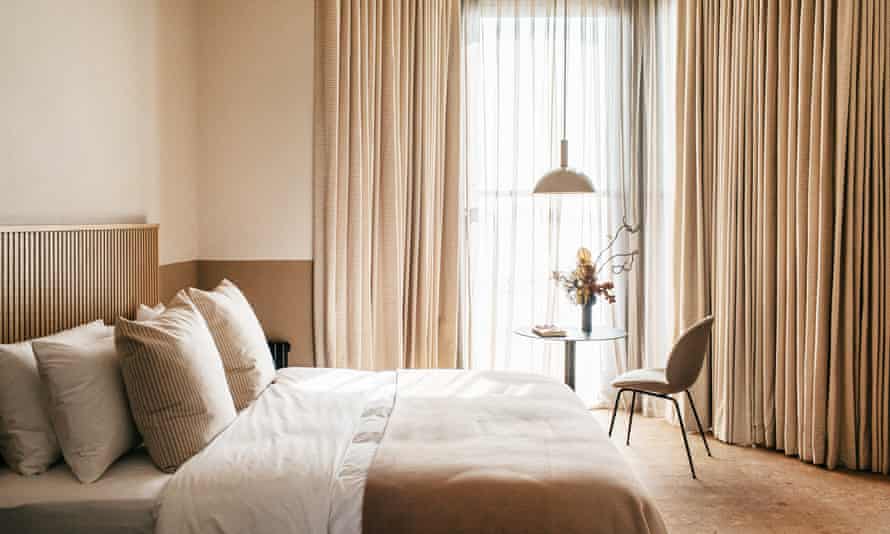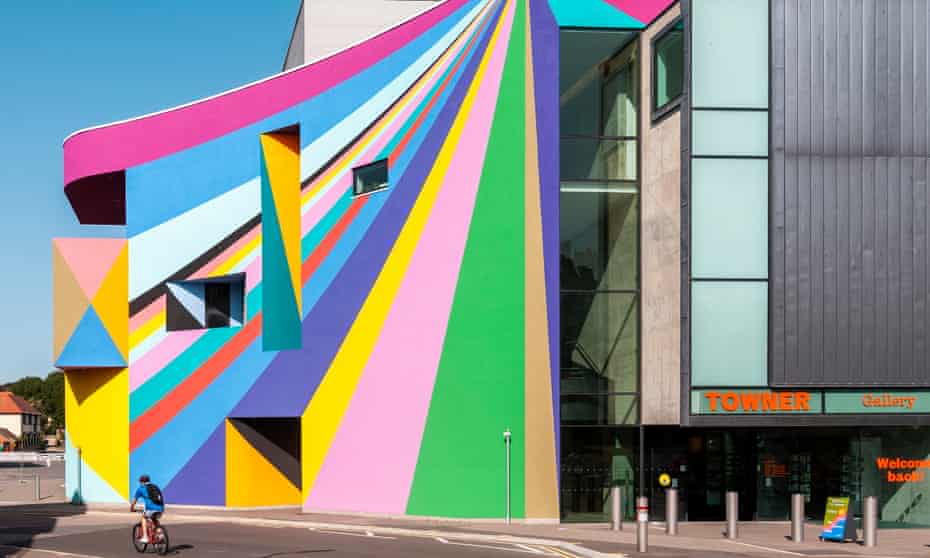The airy restaurant-cum-reception of Eastbourne’s newest hotel, Port, has blush pink walls hung with local art above mid-century modern furniture, and is filled with the clatter of sharing plates being passed around. Sitting here, I find it hard to imagine how this boutique newcomer could provoke any controversy.
Yet it did. Before Port opened its doors in May, a local Facebook page was flooded with comments. Residents argued about the black facade standing out from the traditional white seafront buildings. Was Port adding a touch of modern design to the town and broadening its appeal; or ruining the very essence of this grand seaside spot?

Eastbourne’s transformation has been bubbling along quietly for some years. In 2009, its flagship art space, the Towner gallery, was upgraded to its current building: a spacious architectural feat, fit for a growing hub that now holds one of the biggest collections on the south coast. Margate’s Turner Contemporary and the Tate in St Ives have shown how the visual arts can be a catalyst for regenerating seaside towns, attracting new visitors eager to spend. Add to that demographic changes (families priced out of nearby Brighton have been buying here, altering the town’s reputation as a retirement haven), and a pandemic prompting Brits to holiday at home, and it’s fair to say Eastbourne is having a moment.
I begin my trip at its first artistic attraction, Beachy Head – the dramatic chalk headland where the South Downs drop into the sea. It has been attracting poets and painters to the town for centuries, and these days draws walkers, cyclists and birdwatchers too. It’s drizzling when I arrive, and the wind is loud in my ears. Undeterred, ramblers trot along the cliff’s edge, weaving through trees bent sideways by wind and stopping to take selfies at the red-and-white lighthouse poking up from the water, or against the Seven Sisters cliffs further west.
The walk from Beachy Head to Eastbourne takes roughly an hour, offering panoramic views of the town and the Downs. But we drive back into town, down the five-mile promenade lined with grand Victorian hotels; past the bandstand, a vintage marvel seating 1,600 (and, from 22 July, hosting evening tribute shows); and past where the impressive pleasure pier juts out from the pebbly beach, the gold dome of the pavilion (which hosted a nightclub until 2018) twinkling in the sun.

Families gather around the amusement arcade, while groups of friends browse the street food stalls on the parade. It’s busy enough for midweek, but I’m struck by how calm and spacious it feels. Eastbourne is bigger than most arty seaside towns, but does not attract the high, chaotic footfall of stag and hen dos like Brighton or Bournemouth. The sense that there is room here – physical rooms for visitors, and metaphorical room for development – is apparent.
Which is exactly how Port came to be. The brainchild of property developer Peter Cadwallader, the hotel aims to attract arty city dwellers to the seaside – something he says was missing from Eastbourne’s offering. “My hope is other hotels copy us,” he says.
It’s focus on sustainability chimes with this: cork floors, Faith in Nature products, ingredients sourced from within 30 miles, and room service run through WhatsApp. It has 19 rooms, five of which look seaward, including the “apartment”, a luxury suite with sea views from the bath. We stay in a standard “town” room. Compact and designed with minimalism and sustainability in mind – a clothing rail instead of a wardrobe, milk available on request rather than wasting away in the fridge – it manages to fit in a desk, a Nespresso machine and a Netflix-ready TV without feeling cramped.

Clearly Port is doing something right. The dining room is full when we tuck into our dinner of shared plates: highlights include barbecued mullet, its smokiness cut through with a sharp yet sweet red pepper salsa; and asparagus with capers and lemon preserves bringing a cleansing acidity. A dessert of almond and blood orange financier elegantly paired with a burwash rose cheese from Sussex’s High Welad will be well memorialised on Instagram, as will the brunch offering of duck royale – confit duck leg and egg served on a waffle – . The sea-view drinks terrace is full, too, until the rain empties it.
We’d slipped off before dinner to Levels, a bottle shop and tasting room in a small row of charming antique and craft shops behind the seafront’s Grand Hotel, to sample some crisp, apple-noted English sparkling wine from the nearby Rathfinny Estate. Levels is arguably out of place here, because Eastbourne’s burgeoning independent drinking scene centres on Little Chelsea, away from the sea near the station.
Alongside its craft beer outlets, Little Chelsea offers chic coffee stops and curiosity shops in spades. Book lovers could easily disappear among the shelves at Camilla’s, an antiquarian and rare bookshop where the tomes are piled high, and the Chelsea Antiques Emporium is a higgledy-piggeldy institute where every item has a story that staff like to tell (“time wasters welcome”, it says on the front door, a phrase that surely encapsulates the leisurely pace of Eastbourne).

No trip would be complete without a visit to its crown jewel, Towner art gallery. It is a scrumptious size – big enough to justify the journey, small enough for visitors to leave satisfied – and has pulled in big-name artists including David Hockney. A show by lauded feminist collective the Guerilla Girls has just opened (until 18 July), and its rainbow frontage is a work of art by German muralist Lother Götz.
I spend an afternoon immersed in the graphic art of Eric Ravilious’ – Eastbourne’s answer to Margate’s JMW Turner – and familiarising myself with Mariana Castillo Deball’s selection of archive works depicting the local landscape. White cliffs, turquoise waves, fields of green and yellow, shown in a thousand inspired ways area fitting reminder of the enduring appeal of this part of the country.




